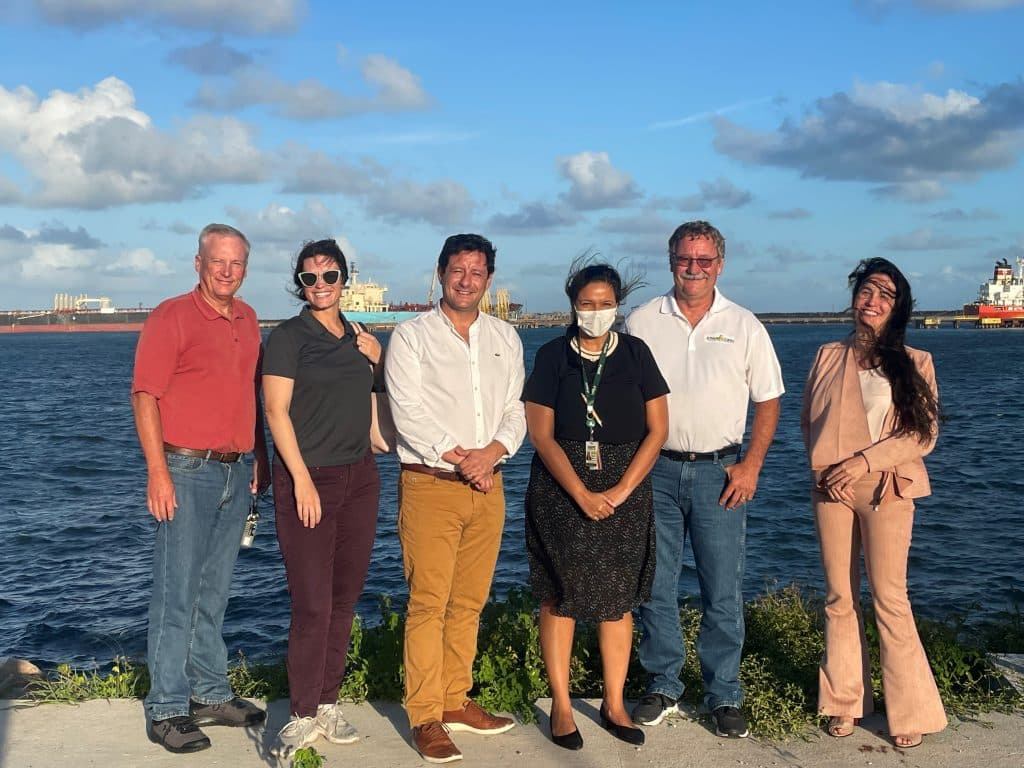A U.S. Grains Council (USGC) team traveled to Brazil last week to learn about the market potential Brazilian corn ethanol has domestically and globally and about logistics faced by U.S. ethanol exporters to Brazil at the main ports situated in the northeastern part of the country.
USGC Director of Global Ethanol Export Development Mackenzie Boubin; USGC Latin America Ethanol Consultant Juan Sebastian Diaz; Ethanol Advisory Team member Kelly Nieuwenhuis of the Iowa Corn Promotion Board; and Duane Kristensen from Chief Ethanol Fuels Inc. made up the team.
While there, the group had the opportunity to meet with many different industry associations, ethanol producers, port operators and union leaders in the country, including the National Union of Corn Ethanol (UNEM), the Brazilian Association of Soy Producers (APROSOJA), Mato Grosso Institute of Agricultural Economics (IMEA), FS Bioenergy, Suape Port, Pernambuco Maritime Terminals (TEMAPE), Atlantimport and Sindacucar/PE.
“By meeting port authorities and ethanol traders, the group was able to learn the complexity of trading ethanol in the north and northeast area in Brazil and to assess the potential obstacles that the industry needs to overcome to regain market share in the country,” Diaz said.
The Council has been active in Brazil advocating to reduce the duties applied to U.S. ethanol and to help certify ethanol plants under the RenovaBio program. In March 2022, Brazil decided to drop the common Mercosur duty of 20 percent on all ethanol imports until Dec. 31 as an effort against inflation. Council efforts this year have been aimed at turning this into a permanent decision.
The RenovaBio program continues to be unreachable for U.S. exporters since the Brazilian government has not defined the rules for other feedstocks to get certified under the program. The Council is working to reduce the extensive data requirements and to unify land use criteria that currently limits U.S. corn ethanol from accessing the carbon credit (CBios) market that represents extra revenue for biofuels producers in Brazil.
Brazil has historically been a top three ethanol export market for the U.S. industry – at one point, reaching up to 480 million gallons of exports, during the 2016/2017 marketing year. So far in the 2021/2022 marketing year, Brazil has imported nearly 99 million gallons of U.S. ethanol, making the country the fifth largest market for the U.S. commodity at this time.
“Brazil enjoys an average ethanol blend of 27.5 percent within their national fuel supply, making it the top per capita consumer of ethanol in the world. The Council seeks to learn how both the U.S. and other countries could implement similar high blend levels within our respective fuel infrastructures, and this mission provided value on the various pathways to achieve such success,” Boubin said.
“The current pricing dynamics in Brazil are very favorable to U.S. product. The Council continues to promote the value of U.S. ethanol supply to compliment Brazil’s growing ethanol production and consumption, key in maintaining and growing U.S. market access to this vital trading partner.”
About The U.S. Grains Council
The U.S. Grains Council develops export markets for U.S. barley, corn, sorghum and related products including distiller’s dried grains with solubles (DDGS) and ethanol. With full-time presence in 28 locations, the Council operates programs in more than 50 countries and the European Union. The Council believes exports are vital to global economic development and to U.S. agriculture’s profitability. Detailed information about the Council and its programs is online at www.grains.org.

